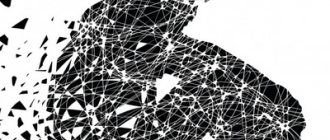Losing control over one's own behavior is something that every person fears.
It’s scary to even imagine what could happen then. Alarmists, neurotics, and high-spirited people already partially imagine what it’s like to be unable to curb their own behavior. Public incidents have occurred more than once in their lives - a panic attack in a full bus, a nervous breakdown in front of all their colleagues, nausea and vomiting when they find themselves in a phobic situation. In fact, patients with disorders and disruptions of the central nervous system are closer than others to serious mental disorders, for example, schizophrenia. And this does not mean that such people will necessarily become ill with something spiritual and go to a psychiatric clinic. However, the fear of schizophrenia permeates the consciousness so much that a person forgets a full, joyful life and begins to “survive” in captivity of his terrible fantasies.
Who is at risk of becoming ill with fear?
The fear of schizopathy is inherent in any person to one degree or another. But why are some people able to leave it at the embryonic stage, while others themselves water it with fantasies and speculation? As mentioned above, overly nervous and suspicious people are more susceptible to contracting the phobia of schizophrenia, since life continually puts them in situations of lost control. The risk group for schizophobia is presented in the table.
| Disorder/condition | What feeds fear? | What could this lead to? |
| Hypochondria |
| The medical illiteracy of some people (or excessive suspiciousness) forces fear to acquire new forms. A person acquires additional phobias, which progress and lead to more serious disorders/depression. |
| Unhinged central nervous system |
| The person withdraws into himself, not finding support from loved ones, who are probably already “fed up” with his fantasies. Uncontrolled use of sedatives can have a detrimental effect on the body. The patient is at risk of developing deep depression and suicidal thoughts. |
| VSD |
| The fear of getting schizophrenia turns into a real race in a vicious circle, taking on new forms and manifestations. The VSD worker is sure: he knows better than doctors how his head and psyche work, and therefore everything that he considers abnormal is so. And the doctors are just insensitive and incompetent people who want him to go to a mental hospital as quickly as possible. If such a condition is ignored, it will certainly end in severe depression with a whole bunch of new phobias. |
| OCD/GAD |
| In this situation, it is easiest to deal with the phobia of schizophrenia, since it is a secondary condition. The first place for a neurotic is always the timely and accurate execution of rituals. By curing OCD, you can forever get rid of the fear of becoming schizophrenic. |
We recommend reading: Claustrophobia, or how to overcome the fear of closed spaces?
Panic attacks or schizophrenia and how to deal with it?!
I was surprised that there was nothing about OCD in the answers, so I’ll start with it.
I have been suffering from OCD for three years, in an acute form for the last six months.
Does it interfere with your life? Yes. A few weeks ago I couldn’t leave the house (I didn’t go to college, I didn’t go to the store, nothing.), because I couldn’t get rid of the thought that as soon as I left the threshold, the apartment would flood.
I can throw a tantrum (and have done it more than once) if there is a filling in the food that I didn’t know about, or if there is anything yellow on the plate (Corn, mustard, etc.)
To me, OCD is more like a virus: it is an addition to your own consciousness imposed by some defect, a failure of rationality, a control mechanism gone wild.
As the name suggests, OCD is divided into obsessions (Intrusive fears and thoughts) and compulsions (Repetitive behaviors designed to relieve fear), and I can't say which is worse. Imagine a song stuck in your head; multiply the effect by a thousand and you get the power of obsession. There are different obsessions - just read on Wiki - the most common ones are the desire for order and hand washing.
My latest obsession was an attempt to escape from the “insane illogicality of objects” and arrange all the objects in the room according to size. She became hysterical from the inability to put the books in one continuous row.
One of the interesting details: you are well aware that your actions not only will not affect the situation in any way, but also seem at least strange to an outside observer. You understand, but you can’t stop doing them. OCD is a reverse love for chocolate: you buy Alpen Gold to make you feel good, but you flip the switch 5 times so you don’t feel bad. Compulsion does not bring pleasure - it is perceived as an imperative action necessary for survival. For example, if I don’t knock ten times on the door of my apartment when leaving in the morning, I won’t be able to go further than the elevator—I’ll be overcome first by mild anxiety and then by full-blown panic.
How to fight? Long, thorough work with a psychologist (in the early stages) or psychiatrist. Some useful tricks:
– Rationalization. Sometimes it helps to imagine in detail the outcome of even the most unlikely obsessions in order to understand how low the likelihood is that your fears will come true;
– In case of loss of control (Did I turn off the iron? Etc.), the best weapon is taking notes on your phone or sending short text messages to your family. In case of growing doubt, you will have evidence;
– Minimization: replacing several repetitive actions with one. For example, after a month of attempts, I managed to replace the complex “run your hand along the edge of the plates - turn the tap off to the maximum - knock on the corner of the cabinet - hang the kitchen towel - stroke the tap” with one short clap on the countertop;
– Working with yourself: It is VERY important to understand that your actions are not justified by logic, cannot influence anything, and their failure to do so will not entail any consequences;
– Protection: at the moment of committing compulsive actions, it seems that they are the only thing that can protect you. Try to replace them with positive impulses: take your loved one’s hand instead of checking if the stove is turned off, turn on your favorite song instead of running to wash your hands;
– Ask for help: attentive friends in most cases notice your problem and are ready to help. It's much easier to stop folding napkins into isosceles triangles if your friend shows no interest in this activity.
In other questions they talked a lot about PA, so I won’t go into detail. Here's what helps me:
– Remember all the symptoms in as much detail as possible and make sure that I have no justified PA, and in reality nothing threatens my life;
– Write to those closest to you to make sure everything is okay with them;
– Take the most compact and stable position: ideally, sit with your back to the wall, hugging yourself with your arms;
– !!!!! Breath. Concentrate only and exclusively on inhaling and exhaling. A great, irreplaceable thing for PA is Ujjayi breathing, information about it can easily be found on the Internet;
– Litany against fear. It helps me a lot to repeat it (The text can be found here: wikipedia.org);
– Slow down: have you noticed that during PA the pace of speech accelerates significantly, thoughts quickly replace one another? Slow down. Try to break each idea into several, analyze it, do everything more slowly;
– Rhythm: choose a rhythmic song and sing it to yourself;
– Attentive friends: nothing compares to the feeling of safety and security from a hug from someone you trust.
These are just a few recommendations, but the main advice that can be given is not to delay treatment and immediately contact a specialist. Good luck!
Schizophrenia
Schizophrenia
- a mental disorder, which is accompanied by a violation of the perception of reality, thinking suffers. The disease is classified as a group of endogenous psychoses, since the development of the disease is provoked not by external factors, but by internal ones.
Schizophrenia is a chronic disorder of thought. The patient's memory, intellect, sense organs and brain work normally, but the consciousness interprets the information received in a special way.
Symptoms
- Hallucinations, distortion of reality.
- Speech disorders, association defects. During a conversation, a person does not construct complex sentences, since he cannot form a logical chain.
- Obsessions.
- Reluctance to communicate, isolation.
- Lethargy, apathy.
- Lack of will to live.
- Closedness, lack of communication, the will to live disappears, he becomes lethargic and apathetic.
- Autism. The person does not maintain dialogue, is immersed in his own world, does not respond to external stimuli, and does not maintain communication.
- Inappropriate reaction to events. Laughter at a sad event, sadness at a funny one.
- Inability to make decisions.
- Sudden mood swings.
- Inability to receive pleasure.
- Lack of motivation.
- Violation of emotional connection with family and friends.
- Absence or weak expression of emotions.
Causes
- Heredity.
- Infections transmitted in utero.
- Sexual or physical abuse of the patient suffered in childhood.
- Anomalies in the structure of brain structures.
- Psychological trauma.
- Metabolic disease.
Only a doctor can make an accurate diagnosis of each disease after examination and conversation with the patient. For differential diagnosis, certain tests and analyzes are performed.
Treatment methods for mental disorders include drug therapy, which is selected individually in accordance with the medical history and severity of the disease.
Psychotherapy plays an important role. Individual and group psychotherapeutic sessions allow the patient to work through the causes of the disease. Physiotherapeutic techniques help to comprehensively restore health.
Comprehensive inpatient treatment at the clinic has shown its effectiveness. In the hospital, patients receive round-the-clock care, undergo individually tailored treatment, take medications, visit a psychotherapist, and also undergo physical therapy sessions. The duration of therapy is determined by the type of disease and its severity.
Obsessive state
Hypochondriacal delusions are a sure sign of this type of schizophrenia. With such a symptom, patients constantly come to the clinic and consult doctors, hoping that they will relieve them of a non-existent illness.
If after the examination the doctor declares that the person is healthy and has no problems, the patient begins to show aggression. Start complaining and even making threats, convinced that the diagnosis was incorrect. It is impossible to convince someone in this state.
The visit to doctors' offices continues. Depending on the doctor’s specialization, complaints may vary; for example, a cardiologist may have heart problems, while a rheumatologist may have back pain. The patient makes his own diagnosis, and at the appointment he only waits for it to be confirmed.
There is often a fine line between hypochondria and full-blown hypochondriacal schizophrenia. When a patient tells a doctor that he has cancer, he is a classic hypochondriac. If he reacts aggressively to an unconfirmed diagnosis, he resorts to threats - this is a typical model of behavior of a hypochondriacal schizophrenic.
Increased anxiety
Increased anxiety
. The daily flow of news causes anxiety, which gradually transforms into panic attacks.
Symptoms
Constant fear, beyond rational control, prevents a person from enjoying life.
Overload of the nervous system leads to a deterioration of not only mental, but also physical condition. Headaches, dry mouth, increased sweating, tachycardia, and excessive muscle tension appear.
A person with increased anxiety has difficulty sitting in one place, is irritable, and has difficulty concentrating on simple tasks. A person has problems sleeping.
Causes
- Heredity, improper upbringing in childhood.
- Stress, psychological or physical trauma, negative life experiences.
- Chronic diseases.
- Lack of sleep, rest, exercise.
PsyAndNeuro.ru
Along with the positive, negative and cognitive symptoms of schizophrenia that constitute the main diagnostic criteria for schizophrenia, a growing body of research shows that patients with schizophrenia often have comorbid sleep disorders, which also affect the quality of life of patients and may even act as predictors of deterioration of the condition. .
Sleep disturbances - most often insomnia (insomnia) - are the most commonly reported symptom in people in the prodromal phase of schizophrenia. In addition, both self-report and objective sleep measures demonstrate differential sleep-wake cycle disturbances in both individuals at high risk for developing psychosis and those with an established diagnosis of schizophrenia. For this reason, many researchers have pointed out the connection between sleep disturbances and the severity of symptoms of schizophrenia in patients. However, data on these associations and their associated risks have yet to be comprehensively studied. In a new paper published in Nature of Science and Sleep, researchers led by Kaskie RE reviewed the results of 54 studies that examined this connection.
The material was prepared as part of the ProSchizophrenia - a specialized section of the official website of the Russian Society of Psychiatrists, dedicated to schizophrenia, modern approaches to its diagnosis and treatment.
In animal and human experiments, dopamine receptor dysfunction has been found to underlie the association between sleep disorders and schizophrenia. For example, in a study that recorded sleep in 20 healthy men, the duration of the first stage of slow-wave sleep was 47% higher compared to baseline in participants who received the dopamine D1 receptor antagonist NNC-687 versus placebo. The D1-dopamine receptor antagonist increased the total number, frequency and duration of sleep spindles (sigma rhythm) and delta waves.
Almost all antipsychotic drugs are, at least in part, antagonists of D2-dopamine receptors, which ensures a reduction in positive symptoms, because the hyperactivity of these receptors is reduced and dopamine is prevented from binding to them. Many studies examining patients after stopping antipsychotics suggest that severe psychotic symptoms are more likely to develop in patients with sleep disorders than in patients without any sleep-wake cycle disorders.
Because antipsychotics work by blocking dopamine D2 receptors, they can lead to (or worsen) RLS and/or periodic limb movement disorder. Thus, one study found a significantly higher incidence of RLS and prevalence of RLS symptoms in patients with schizophrenia compared with controls (21.4% and 47.8% versus 9.3% and 19.4%, respectively).
Various studies have reported a high prevalence of OSA in patients with schizophrenia—15.4% in a meta-analysis. Obesity may be one of the factors underlying this comorbidity. According to the review authors, excessive weight gain is a common side effect of antipsychotic therapy, so both genetically determined and drug-induced obesity can lead to OSA.
There are many approaches that can effectively treat insomnia in patients with schizophrenia. Cognitive behavioral therapy can be used to address problems such as lack of daytime activity, intrusive thoughts or hallucinations before bed, or concerns about not being able to sleep. For acute insomnia, paliperidone, olanzapine and other “atypical” antipsychotics, as well as hypnotics such as zopiclone and melatonin, have been demonstrated to be effective.
Schizophrenia and sleep disorders are associated with a higher risk of developing various pathologies. Patients with these comorbid disorders tend to have poorer outcomes and quality of life, higher mortality, and more severe symptoms of the underlying disease. “In addition, sleep disturbances affect social and cognitive functioning and therefore contribute significantly to the daily problems commonly experienced by patients with schizophrenia,” said co-author Fabio Ferrelli, MD, assistant professor of psychiatry at the University of Pennsylvania.
According to the authors, the role of poor sleep in overcoming or exacerbating various psychiatric symptoms, including hallucinations, paranoia, poor concentration and depressed mood, should not be underestimated. If a doctor works to improve the quality of their patients' sleep, there's a good chance that some of their symptoms will improve, too.
Prepared by: Kasyanov E.D.
Source: Tori Rodriguez Understanding the Links Between Schizophrenia and Sleep Disorders. www.psychiatryadvisor.com
Kaskie RE, Graziano B, Ferrarelli F. Schizophrenia and sleep disorders: links, risks, and management challenges. Nat Sci Sleep. 2017;9:227-239.
Neurasthenia
Neurasthenia
- a pathology of the nervous system that occurs after excessive mental and physical stress, so common in a big city.
Symptoms
- Fast fatiguability.
- Headaches and heartaches.
- Tachycardia.
- Decreased libido, premature ejaculation.
- Problems with the gastrointestinal tract.
- Excessive irritability, sudden mood swings.
- Low performance, inability to concentrate.
- Lethargy, lack of interest in life.
- Sleep problems (difficulty falling asleep, waking up at night).
- Difficulty remembering information.
Causes
- Excessive stress at work.
- Lack of sleep and rest.
- Stressful situations.
- Chronic diseases of internal organs.
- Oncological or autoimmune diseases.
- Intoxication of the body.
- Deficiency of vitamins and minerals.
Features of panic attacks
A panic attack in patients suffering from indolent schizophrenia, as well as in healthy people, makes itself felt by an inexplicable attack of anxiety, during which a person develops not only painful fear, but also many somatic symptoms, and they can be very individual.
In addition to disorders caused by the development of schizophrenia, the causes of panic attacks can be frequent stress, difficult life circumstances, and hereditary predisposition also plays a role.
Symptoms of this disorder may not occur in every person with schizophrenia. Typically, panic attacks affect people with a special character. According to experts, patients with an anxious-hypochondriac personality type are significantly susceptible to panic attacks, since their blood contains a higher level of the anxiety hormone.
It should be noted that panic disorders are often identified with other diseases, so it is necessary to know the main manifestations.
Causes of mental disorders
According to the findings of a number of scientists who have been working to identify the causes of the disease for many years, there are a number of factors that provoke mental disorders.
- Heredity - transmission of a disease at the genetic level from parents, grandparents, etc.
- Psychoanalytic . The disease occurs against a background of stress, infectious diseases, injuries, and overexertion.
- Dopamine - an excess of this hormone affects the functioning of nerve impulses.
- Dysontogenetic - the disease is already embedded in a person’s genes, and due to external factors - trauma, stress, infection, etc., it “pops up” to the outside.
Depression in schizophrenia and depressive schizophrenia
According to research, schizophrenics are more likely to suffer from depression than others. Most patients experience sadness and a feeling of depression. Depressive symptoms are equally common in men and women.
If depression can stop during schizophrenia, then in the depressive form of schizophrenia it is the determining factor. There are a number of factors that can contribute to the occurrence of the depressive form of this disease:
- Diseases. Depressive symptoms can be caused by certain physical conditions, such as thyroid disorders or anemia.
- By-effect. Side effects of medications can also cause severe mental disorders. This applies to antibiotics, antidepressants, and antiallergic drugs.
- Schizoaffective disorder. With this type of disorder, depression will manifest itself along with hallucinations and paranoia.
- Drugs. Drugs, including cocaine and cannabis, will cause feelings of depression, sometimes lasting for several days after taking them.
- Loneliness. 3/4 of people with schizophrenia experience loneliness. The causes of loneliness may be due to psychological factors. For example, this may be due to a lack of communication skills or low self-esteem. For some people, loneliness can become a chronic problem. It can lead to self-destruction and suicide, and negatively affect the personal qualities of perseverance and will.
- Despair and disappointment. Schizophrenia often appears during adolescence. At this time, teenagers are psychologically vulnerable. Disappointment from unfulfilled hopes and strong emotions experienced provoke the emergence of mental problems.
- Life shocks. Life events such as bereavement can lead to severe stress, psychosis, and depressive schizophrenia. Increased sensitivity to stress can cause people to completely withdraw from society.









